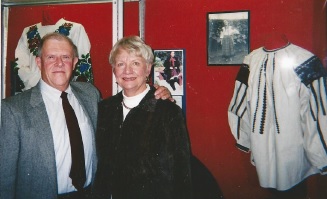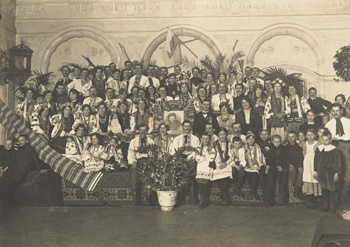
Feature Article
Ukrainians in China: A gift from California to the Ukrainian Diaspora Studies Initiative
by The Canadian Institute of Ukrainian Studies (CIUS)
The Ukrainian Diaspora Studies Initiative at the Canadian Institute of Ukrainian Studies is pleased to announce the receipt of a number of materials relating to the history of Ukrainian life in the Far East. The gift was generously provided by Nicholas Melnik of Fullerton, California, and his wife, Pat (née Cwikilewich), who is originally from Edmonton.

The donated materials include priceless photographs of individuals and Ukrainian community life in China, personal documents, correspondence between members of Ukrainian organizations in North America and Europe and representatives of Ukrainian communities in Tientsin and Shanghai, China (from the 1930s to 1947), and individual issues of newspapers in China and the Russian Far East. These include such titles as Khvylia Ukraїny, Ukraїns'ke zhyttia, and Ranok, published in the eastern Siberian city of Khabarovsk; and Zasiv, Mandzhurs'kyi vistnyk, and Samostiina Ukraїna, which appeared in China.
Nicholas Melnik’s parents were born in Ukraine. His father, Omelian, was born in the town of Lypovets in the Kyiv region in 1896. The Melnik family was drawn to the Far East by the promise of land and employment on the Chinese Eastern Railway. Eventually, the family settled in Harbin, Manchuria. There, after two years of military service, Omelian attended the Far East Technical Institute and graduated in Oriental studies. Following his graduation and given his facility in various Chinese dialects, he was employed by the Chinese Maritime Customs Service. Omelian’s work later took him to various Chinese entry ports as a customs officer.
It was in Harbin that Omelian Melnik met his future wife, Marianna Karlo. Marianna’s family came from the Kamianets-Podilskyi region. After their relocation from Ukraine to eastern Siberia by the Russian imperial government in the late nineteenth century, family members initially settled in the small villages of Sarovka and Nakhodka near Khabarovsk. Later, Marianna and her family moved to Harbin. Marianna’s father, Prokop Hordiievsky, a graduate of the Kamianets-Podilskyi seminary, was invited to head a Ukrainian Orthodox parish in Harbin. Marianna’s mother, Olena Shvachynska, was educated in the Kamianets-Podilskyi Women’s College and continued her teaching career in the Far East. The Hordiievskys were accompanied by Liubov Balaniuk, an orphan from Kamianets-Podilskyi, who was considered a member of the family. Father Prokop Hordiievsky passed away in Harbin and is buried there. Olena Shvachynska is buried in Tientsin.
Because of political upheavals of the era, Nicholas’s grandmother retained her maiden name (Shvachynska), and his mother, Marianna, used the surname of her paternal aunt and uncle, Karlo. Marianna Karlo Melnik was educated in Harbin. There she attained higher education that facilitated her employment as a comptroller with the Chinese Eastern Railway Company in Harbin. She married Omelian Melnik in l934. Later she earned a nursing degree in Tientsin. Both of Nicholas’s parents were active in helping establish and maintain Ukrainian organizations in China and developed ties with Ukrainian organizations in other parts of the world.
Nicholas Melnik was born in Shanghai in l935. A few years later, in 1939, the Melniks visited Canada and the United States with a view to immigrating to North America. They were unable to do so until 1948, when they were sponsored by relatives in San Francisco. After proudly obtaining American citizenship, the Melniks in turn sponsored many displaced Ukrainians, especially Liubov Balaniuk, who was relocated by the United Nations Relief and Rehabilitation Administration to the Philippines and was able to rejoin the family in San Francisco in 1953.
The family was able to bring to North America many valuable items, preserving these for decades before finding new homes for them at repositories in the United States and Canada. Their collection included Ukrainian artifacts (both religious and others), books, documents, photos of daily life and organizations, newspapers, postcards (art and geographical), stamps, and textiles.
These materials constitute important sources for the study of the once vibrant Ukrainian community in China and its ties to the diaspora in other parts of the world. According to an estimate, there were at one time as many as 100,000 Ukrainians living in China. After the fall of Nationalist China, Ukrainian communities all but disappeared. Many Ukrainians were lured by Soviet consulates to resettle in the USSR, never to be heard from again. Others managed to relocate to South American countries that accepted stateless immigrants.

Scores of Ukrainians in China moved to Argentina in the late 1940s. Among them was Osyp Snizhny, who promoted the bandura in that country of the southern hemisphere. Before heading to Buenos Aires the maestro had done much the same in Shanghai, teaching a new generation how to play the instrument and applying himself to its manufacture. To this day, Nicholas Melnik still has and treasures the bandura that Snizhny made for him as a child.
We are extremely indebted to the Melniks for having kept these materials in good condition over the decades and for their efforts in finding repositories that can continue to preserve them for future generations.
The Ukrainian Diaspora Studies Initiative at the Kule Ukrainian Canadian Studies Centre, CIUS, was established in the fall of 2006, when Drs. Peter and Doris Kule gave a lead donation to create an endowment for the study of the Ukrainian diaspora. It is headed by Dr. Serge Cipko, the author of many studies on Ukrainian diaspora topics, including an article about Ukrainians in Manchuria (available online at: https://ejournals.library.ualberta.ca/index.php/pi/article/view/1419/961). Cipko’s most recent book is Ukrainians in Argentina, 1897–1950: The Making of a Community, CIUS Press, 2011. For more about the Ukrainian Diaspora Studies Initiative, visit its homepage: http://www.ualberta.ca/CIUS/ukrcan/Diaspora/UDSI-About_Diaspora_Initiative.htm. To subscribe to the Diaspora Initiative’s e-bulletin, “Ukrainians Abroad: News and Views,” write to scipko@ualberta.ca.
Photo: (1) Nicholas and Pat Melnik. (2) Taras Shevchenko concert in Harbin, China, c. 1920. Seated in the front row, fourth from the centre to the right, is Nicholas Melnik’s mother

